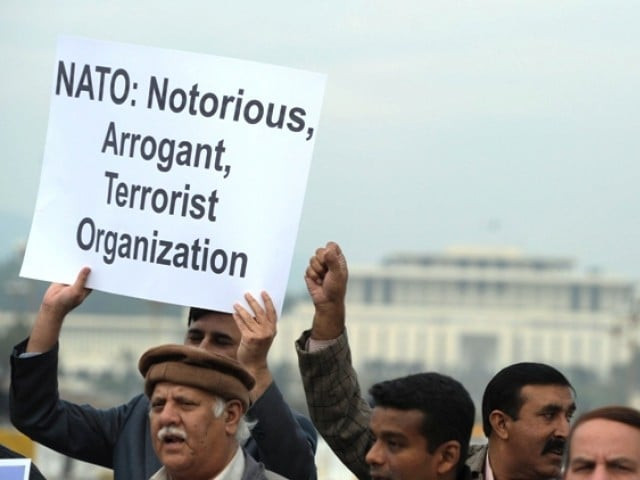The first statement by Tehrik-i-Taliban Pakistan (TTP) coming on the heels of the incident reiterated its anti-Western mantra and reminded the government that the US can never be a friend of Pakistan. Manipulating the tragedy to further humiliate the Pakistan government, the TTP spokesman declared that his organization is not holding any talks with the government of Pakistan because “it is futile to negotiate with a slave country”. In another interview, Maulvi Faqir Muhammad, TTP’s deputy head, advised the government to disengage from the war on terror and dedicate its resources, especially atomic power, for the defense of Muslims.
Calls for Jihad against the US and her allies echoed wild and free in mainland Pakistan as well. Jamaat-ud-Dawa, the mother organization of Lashkar-e-Taiba, held countrywide demonstrations and rallies. The organization vowed to convert Pakistan into a Taliban state and to train young people to wage jihad against America and India. One of the JuD leaders was daring enough to threaten to kill 100 Americans for every Muslim killed. He said:
“Thousands of fighters are ready and waiting for a call from our leader Hafiz Saeed.”
Having suffered extensively at the hands of religiously-motivated individuals and organizations for more than a decade Pakistan has been battling hard to combat extremist ideologies and organizations. Efforts on military and ideological front have yielded desirable outcomes as large chunks of territories previously controlled by the Pakistani Taliban have been cleared and life has returned to normalcy in these areas. On the ideological front, the state, with the help of civil society, have put the Jihadis on the defensive as the support for these organizations dropped sharply during the last few years.
It takes years of constant and conscious efforts to change the mindsets. But strategic blunders such as the un-provoked attack on Pakistani check posts in Mohmand reverse the gains made in decades. These incidents not only harm already strained inter-state relations but also reinforce the Jihadi narrative of “America being the biggest enemy of Islam and Muslims”. Ultimately, anti-Americanism rises to unprecedented levels and becomes the rallying point for anti-Pakistan, anti-US and anti-India Jihadis to gather popular support to pursue their goals.
Various studies show that anti-Americanism is one of the primary factors behind the rise of violent and non-violent forms of radicalization in Pakistani society. Besides other socio-political factors anti-Americanism motivates militants to resort to violence against the Pakistani government that is regarded as a key US ally. For instance, at the organizational level, most suicide attacks in Pakistan have been claimed by Tehrik-i-Taliban Pakistan, Jamiatal-Furqan and Lashkar-e-Jhangvi, which have been vocal in calling the Pakistani government “an American puppet”. In July 2007, a group calling itself the Mujahideen-i-Islam published a pamphlet threatening more suicide attacks against Pakistani security forces if they did not stop “doing the bidding of the United States.” The pamphlet entitled "Until Islam lives in Islamabad" urged Pakistani soldiers to:
"go to your homes and earn halal (pure) income for your families... instead of serving the Americans.”
These terrorist outfits prevail on widespread anti-Americanism in Pakistani society, which also helps them justify their actions against an unpopular government that is perceived to be pro-US and also to draw more recruits from a society which holds the US responsible for all ills, both in Pakistan and the world.
During the first decade of the War on Terror, Pakistan’s public posture as a major non-NATO ally of the US has done more harm to the country than good. The state’s decision to side with the US without addressing widespread anti-Americanism on the societal level led to the emergence of a new generation of Jihadis, which is more lethal, internationalized and antagonistic towards the Pakistani state and society. This new breed of holy fighters that can be best described as the Neo-Taliban does not only pose an existential threat to the country but also aspires to go global.
What needs to be done
If the government of Pakistan opts to soften its stance over the issue without seeking an unconditional apology and assurance from the US-led ISAF forces in Afghanistan to take action against those responsible for the attack, it might strengthen the popular support base of Jihadis in Pakistan and the state’s credibility will further diminish. Extremist and violent outfits are likely to fill the vacuum if the government fails to represent public rage over the issue. In a “business as usual scenario” the military establishment must also not disregard the demoralizing effects on the troops and officer core.
To summarize, in the wake of a deadly US attack on a Pakistani border post, it is in the best interest of Pakistan to take effective measures to appear less pro-American. The US must realize the predicament being faced by the Pakistani government.
International powers with stakes in regional peace must ensure that a major non-NATO ally is not forced to opt for the devil but the deep blue sea.



COMMENTS
Comments are moderated and generally will be posted if they are on-topic and not abusive.
For more information, please see our Comments FAQ